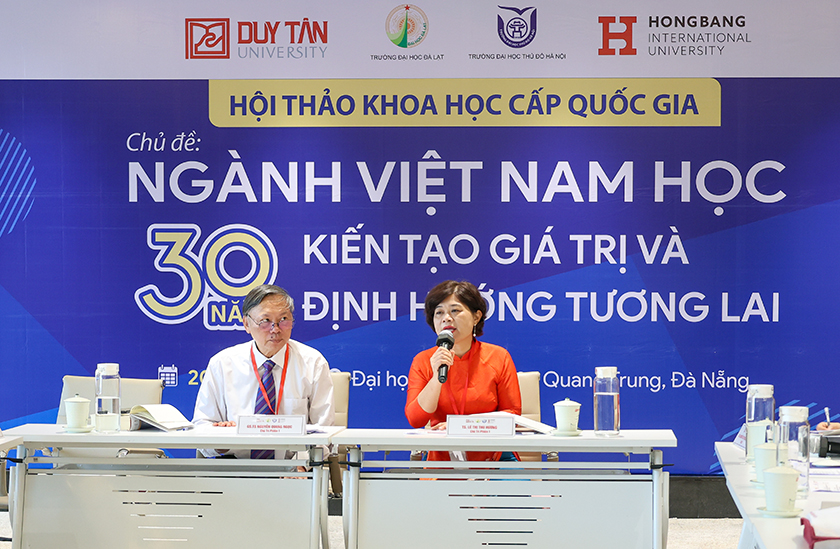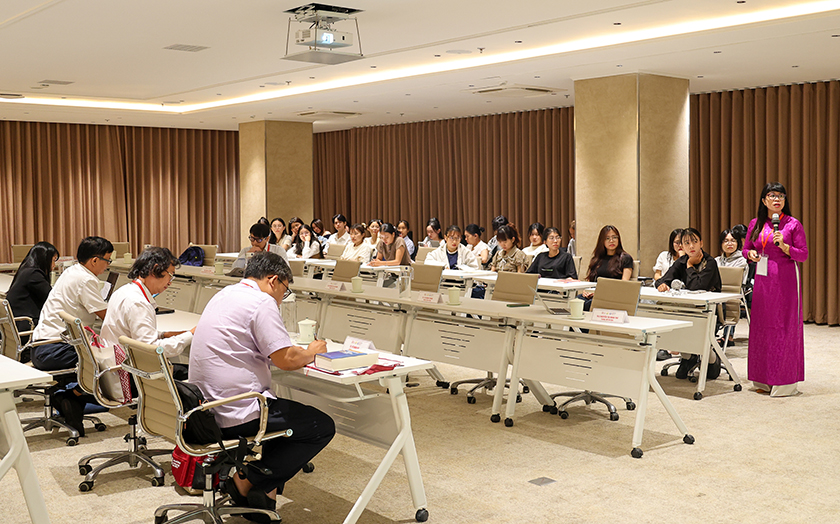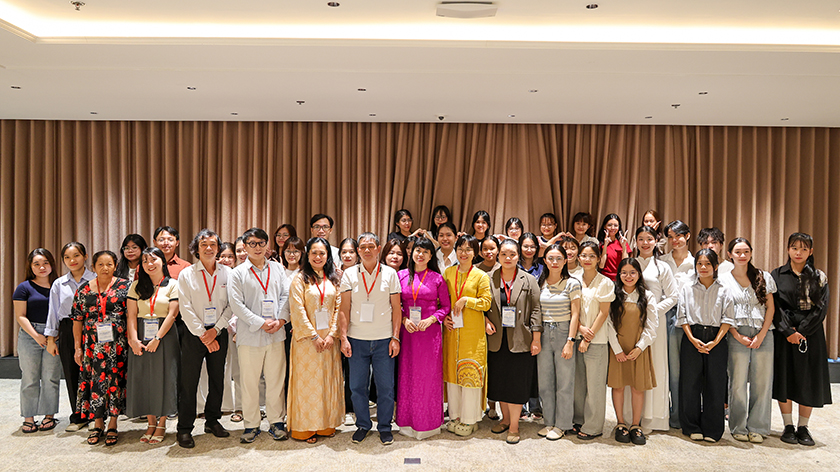The national conference on “Vietnamese studies: Thirty years of creating value and future directions” took place on the afternoon of August 20, 2025, at DT), with the participation of a great many delegates from across the country. It was jointly organized by DTU, Hanoi Metropolitan University, and Hong Bang International University.

Vietnam Association of Historical Sciences Vice Chairman People’s Teacher Prof. Dr Nguyen Quang Ngoc and Dr Le Thi Thu Huong from the Hanoi Metropolitan University chaired the session on “Vietnamese studies: Theoretical foundations and mission in the new era”
The conference was attended by People’s Teacher Prof. Dr Nguyen Quang Ngoc, Vice Chairman of the Vietnam Association of Historical Sciences and former Director of the Institute of Vietnamese Studies & Development Science at the Vietnam National University in Hanoi; Meritorious Teacher Prof. Dr Truong Quang Hai, Vice Chairman of the Vietnam Association of Geographical Sciences and former Deputy Director of the Institute of Vietnamese Studies & Development Science; and scientists, administrators, and lecturers from many universities across the country.
“For the past three decades, Vietnamese studies has developed strongly from a novel discipline into an interdisciplinary science encompassing knowledge of history, culture, language, society, politics, and many other fields,” Dr Hoang Thi Huong, Vice Provost of the DTU School of Languages, Humanities, & Social Sciences explained. “The field has played an important role in the research into and dissemination of our country’s cultural values and has served as an important tool in cultural diplomacy, fostering a sustainable relationship between Vietnam and the world. Alongside the strong growth of the field, we’ve also witnessed the maturation of a multi-disciplinary workforce; more than mastering knowledge, graduates are also equipped with practical work skills required in many sectors like education, tourism, cultural research, and international relations. Today’s conference is therefore more than an occasion to share achievements; it’s also an opportunity to discuss new directions for developing the field of Vietnamese studies to meet the demands of integration and sustainable development in the new era.”

Lecturers from participating universities gave presentations addressing
profound issues in the field of Vietnamese studies
With 54 presentations, the conference painted a comprehensive picture of the field of Vietnamese studies, reflecting its core issues and points of profound academic significance through the following topics:
? Vietnamese studies: Theoretical foundations and mission in the new era. Presentations on this topic revisited the thirty-year journey of the discipline, highlighting its transformation from an academic field into a highly applied science. Dr Bui Van Tuan (Hanoi Metropolitan University) with his paper “Vietnamese studies: Thirty years of creating value and shaping development directions in the new era”, for example, affirmed that Vietnamese studies has transformed knowledge into a driving force for national development. Dr Tran Thi Mai An (University of Science & Education, University of Danang) with her paper “Researching Vietnam from the perspective of region research and undergraduate training in Vietnamese studies in Vietnam” further emphasized the interdisciplinary nature of Vietnamese studies, which enables a holistic understanding of Vietnam and the Vietnamese while positioning the discipline within the broader context of research about the region.

Conference participants
- Training Vietnamese studies: Practice and experience. These presentations analyzed the current situation and training experience. Prof. Dr Truong Quang Hai (Institute of Vietnamese Studies & Development Science) started his presentation “Training Vietnamese studies to meet demand from society through curriculum development” by stressing that Vietnamese studies training must align with demand from society by developing curriculums. Dr Le Thi Thu Huong (Hanoi Metropolitan University) with her presentation “Application-oriented training in Vietnamese studies: Experience from Hanoi Metropolitan University” shared practical training experience and proposed solutions for cooperation between universities and businesses to improve training quality.
- Approaching Vietnamese studies through culture, history, and language. Talks on this topic explored both tangible and intangible cultural values, from belief systems to literature and language. Some notable contributions from DTU lecturers included Dr Vu Hong Thuat’s research on the lion-cat dance of the Tay and Nung people in Lang Son, linking it with community-based tourism development; and Dr. Nguyen Thanh Sinh’s analysis of the worship of Guan Yu among the Chinese community in Hoi An, which highlighted the intersection between culture and belief.
- Creating value from Vietnamese studies in socio-economic development. Presentations on this topic demonstrated the applicability of Vietnamese studies. Dr Hoang Thi Huong (DTU) emphasized the discipline’s role in sustainable tourism development. Other speakers, such as Dr Vo Minh Hai (Quy Nhon University), discussed its role in preserving intangible cultural heritage in Central Vietnam and the Central Highlands, opening new applied research directions in heritage conservation.
The speakers presented specific and applicable research in areas such as sustainable tourism, heritage management, and the creative economy. In particular, the conference made clear the strong connection between Vietnamese studies and tourism, with solutions to improve human resource quality in the tourism sector and discussion of the discipline’s crucial role in cultural heritage preservation.
People’s Teacher Prof. Dr Nguyen Quang Ngoc, Vice Chairman of the Vietnam Association of Historical Sciences and former Director of the Institute of Vietnamese Studies & Development Science, emphasized how the conference provided an opportunity for scholars, lecturers, and administrators to look back on the field’s three-decade journey of creating value, which redefined the mission of Vietnamese studies in the nation’s new era of technological innovation and profound social transformation, and which served as the foundation for the discipline’s development today and in the future.
In recent years, training in Vietnamese studies has been implemented at many universities. The major of Vietnamese Studies at DTU has been methodically developed with a comprehensive training program that equips students with a solid foundation in Vietnam’s culture, history, language, and socio-economics. The program not only emphasizes theoretical knowledge but also provides opportunities for students to engage in practical activities, enabling them to gain broad and in-depth knowledge within their chosen field.
The national conference “Vietnamese studies: Thirty years of creating value and future directions” was truly an important and meaningful academic event. Besides marking a major milestone in the development of Vietnamese studies, it also opened new opportunities for all young people who are currently pursuing or will pursue this discipline.
(Media Center)